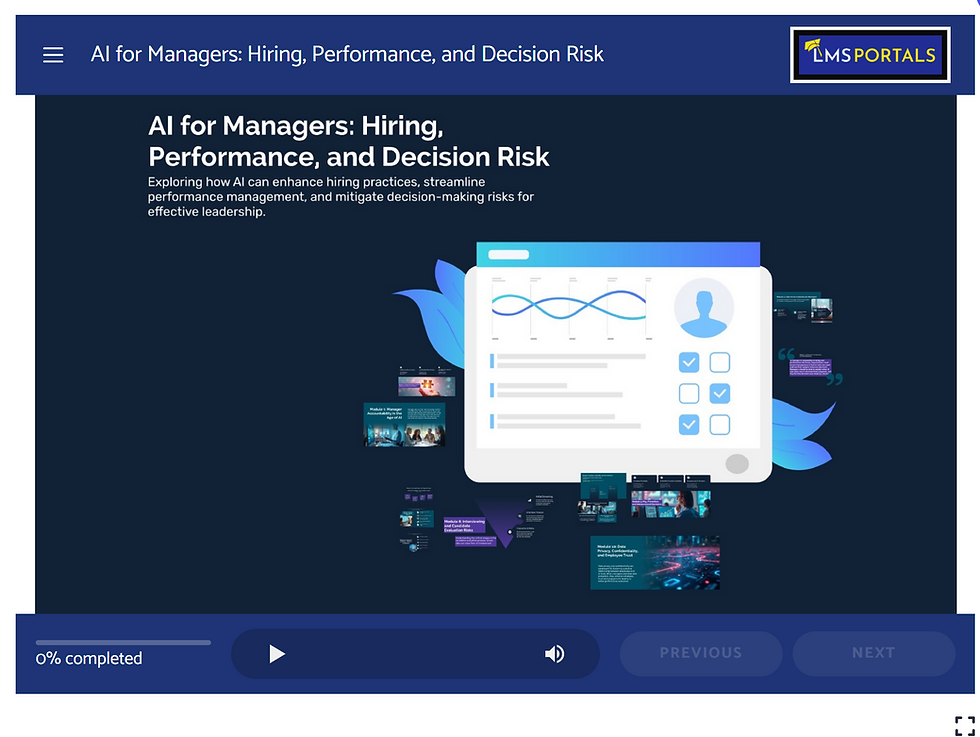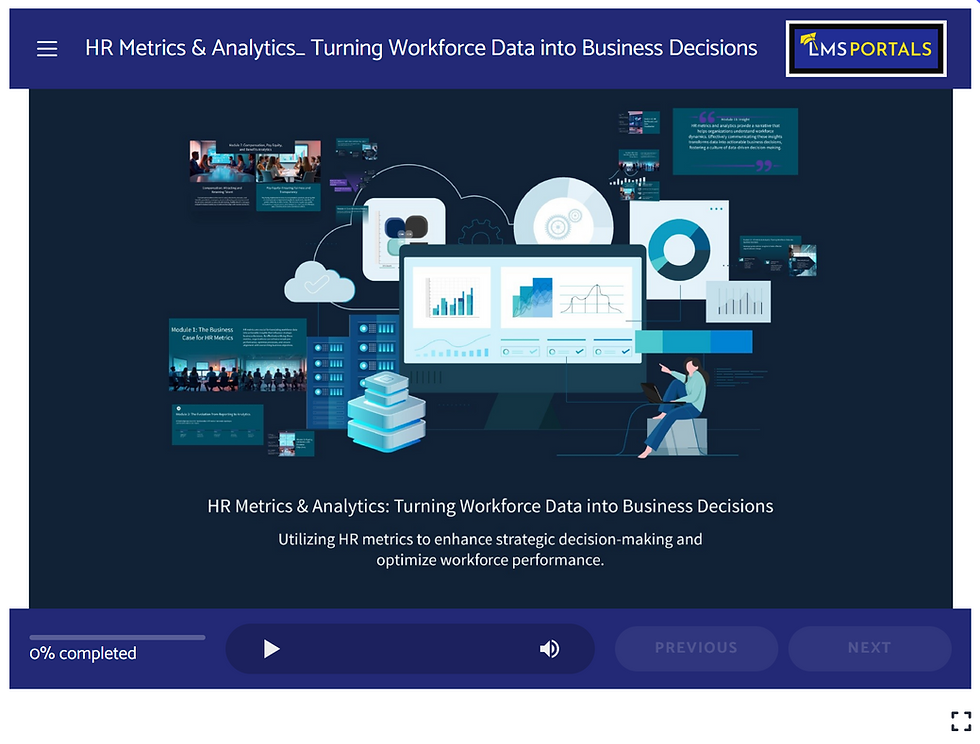eLearning as a Revenue Stream for HR Outsourcing Firms
- LMSPortals

- Aug 16, 2024
- 6 min read

Leveraging eLearning as a revenue stream for HR outsourcing firms is a strategic move that can add significant value to their service offerings. Here’s how HR outsourcing firms can capitalize on eLearning:
1. Develop Specialized eLearning Content
Targeted Training Programs: Create specialized training programs tailored to different industries, compliance requirements, or specific HR functions like recruitment, employee engagement, or performance management.
Custom Solutions: Offer customized eLearning modules that cater to the specific needs of client organizations. This can include bespoke content development and personalized learning paths.
2. Offer Certification Programs
Professional Development: Develop certification programs in areas like leadership, compliance, and HR management that are recognized industry-wide. This can attract individuals and companies looking to upskill their workforce.
Micro-Credentials: Introduce micro-credential programs that allow employees to gain specific skills or knowledge, which can be stackable towards a larger certification.
3. Subscription-Based Models
Access to Learning Libraries: Offer a subscription model where companies pay a monthly or annual fee to access a library of eLearning courses. This provides a steady revenue stream and allows companies to continually upskill their employees.
Tiered Pricing Plans: Implement tiered pricing plans based on the size of the client’s workforce, the level of customization, or the range of available courses.
4. Bundled Services
Integration with HR Services: Bundle eLearning services with traditional HR outsourcing offerings such as payroll, benefits administration, or compliance management. This provides added value to clients and differentiates your services from competitors.
Onboarding Packages: Develop onboarding packages that include essential training for new hires, which can be integrated into the client’s HR processes.
5. Corporate Training Programs
Executive Leadership Programs: Offer high-level leadership training programs aimed at executives and senior management. These programs can command premium pricing and are in high demand.
Diversity and Inclusion Training: Develop programs focused on diversity, equity, and inclusion, which are increasingly prioritized by organizations.
6. Partnerships and Alliances
Collaborate with eLearning Platforms: Partner with established eLearning platforms or Learning Management Systems (LMS) to expand your offerings and reach a broader audience.
Joint Ventures with Educational Institutions: Form partnerships with universities or professional organizations to offer accredited courses that add credibility and attract more clients.
7. White-Labeling and Reselling
White-Label Solutions: Create white-label eLearning solutions that other HR firms or corporate clients can rebrand and sell as their own. This opens up an additional revenue stream through licensing or resale agreements.
Resell Partner Content: Act as a reseller for specialized eLearning content created by other providers, earning a commission on sales while expanding your course offerings.
8. Data and Analytics Services
Learning Analytics: Provide analytics services that track employee progress, course completion rates, and the impact of training on performance. This data can be used to offer insights and recommendations, adding value to your eLearning services.
ROI Analysis: Offer services to measure the ROI of training programs, which can be a critical selling point for clients considering investing in eLearning.
9. Continuous Updates and Content Refresh
Regular Content Updates: Ensure that your eLearning content is regularly updated to reflect the latest trends, regulations, and best practices in HR and various industries.
Feedback-Driven Improvements: Use client and learner feedback to continuously improve and refine your courses, ensuring high satisfaction rates and repeat business.
10. Marketing and Sales Strategies
Content Marketing: Use blogs, webinars, and white papers to demonstrate thought leadership in eLearning for HR, attracting potential clients.
Sales Incentives: Provide incentives for existing clients to add eLearning services to their HR outsourcing package, such as discounts or free trials.
Benefits to HR Outsourcing Firms:
Diversification: Adding eLearning creates multiple revenue streams, reducing dependence on core HR services.
Client Retention: Offering integrated services increases client retention by embedding your firm deeper into their operations.
Competitive Advantage: Stand out in the marketplace by providing comprehensive solutions that address both administrative and developmental needs.
By integrating eLearning into their service offerings, HR outsourcing firms can not only enhance their value proposition but also establish a sustainable and scalable revenue stream.
The Benefits of a White Label Multi-Tenant LMS for HR Outsourcing Firms
A white-label multi-tenant Learning Management System (LMS) offers a unique opportunity for HR outsourcing firms to enhance their service offerings, create new revenue streams, and build stronger client relationships.
Here are the key benefits:
1. Branding Flexibility
White-Labeling: The LMS can be fully branded with the HR firm’s logo, colors, and messaging, allowing them to offer it as a proprietary solution. This enhances brand visibility and creates a seamless experience for clients.
Client-Specific Customization: The multi-tenant nature of the LMS allows each client to have their own branded portal within the system, maintaining consistency with their corporate identity while being managed by the HR firm.
2. Scalability and Cost Efficiency
Multi-Tenant Architecture: This allows the HR firm to serve multiple clients from a single instance of the LMS, significantly reducing the costs associated with managing separate systems for each client.
Economies of Scale: As the client base grows, the HR firm can scale the LMS with minimal additional costs, improving profit margins and enabling them to serve small to large enterprises effectively.
3. Revenue Generation
Subscription and Licensing Fees: HR firms can charge clients subscription fees for access to the LMS, creating a recurring revenue stream. Licensing options can also be offered based on the number of users, features, or the level of customization.
Content Monetization: Firms can monetize their eLearning content by offering courses through the LMS, either on a pay-per-course basis or as part of a broader service package.
4. Enhanced Client Engagement and Retention
Comprehensive HR Solutions: By offering a branded LMS, HR firms can provide a more comprehensive service package, integrating training and development into their existing HR services like payroll, benefits, and compliance management.
Client Stickiness: Once a client’s employees start using the LMS, it becomes a critical part of their HR infrastructure, making them less likely to switch providers.
5. Data Ownership and Control
Full Control Over Data: The HR firm maintains control over all data within the LMS, allowing them to provide detailed reports and insights to clients. This can enhance the firm’s value proposition by offering data-driven HR services.
Compliance and Security: A white-label LMS allows the HR firm to ensure that all data is handled in accordance with local and international regulations, adding another layer of trust and reliability.
6. Customization and Personalization
Tailored Learning Paths: The LMS can be customized to offer tailored learning paths for different organizations or employee groups, ensuring that the training is relevant and aligned with each client’s business objectives.
Feature Customization: HR firms can choose which features to enable for different clients, offering a personalized experience that meets the specific needs of each organization.
7. Improved Client Analytics and Reporting
Advanced Analytics: The multi-tenant LMS provides detailed analytics on learner progress, course completion rates, and engagement levels, which HR firms can use to demonstrate the impact of their training programs to clients.
Custom Reporting: HR firms can offer custom reporting services to clients, providing insights that help them make informed decisions about their workforce development strategies.
8. Easy Integration with Other HR Services
Seamless Integration: A white-label LMS can be integrated with other HR software solutions offered by the firm, such as payroll systems, performance management tools, and employee engagement platforms. This creates a unified HR ecosystem for clients.
Automation of HR Processes: The integration can help automate processes like compliance training and onboarding, making it easier for clients to manage these tasks efficiently.
9. Time-to-Market Advantage
Quick Deployment: A white-label LMS allows HR firms to quickly deploy a ready-made solution under their brand, reducing the time and resources needed to develop a platform from scratch.
Competitive Edge: Offering a white-label LMS gives HR firms a competitive advantage by expanding their service portfolio with minimal upfront investment.
10. Enhanced Client Support and Training
Dedicated Support Channels: HR firms can offer dedicated support and training for their branded LMS, ensuring that clients get the most out of the platform and addressing any issues promptly.
On-Demand Training Resources: The LMS can host on-demand training resources for clients, helping them maximize their use of the platform and improve user adoption rates.
Summary
A white-label multi-tenant LMS empowers HR outsourcing firms to expand their service offerings, build stronger client relationships, and generate new revenue streams. By leveraging the flexibility, scalability, and customization options that such a system provides, HR firms can position themselves as comprehensive solutions providers in the competitive HR outsourcing market.
About LMS Portals
At LMS Portals, we provide our clients and partners with a SaaS-based, multi-tenant learning management system that allows you to launch a dedicated training environment (a portal) for each of your unique audiences.
The system includes built-in, SCORM-compliant rapid course development software that provides a drag and drop engine to enable most anyone to build engaging courses quickly and easily.
We also offer a complete library of ready-made courses, covering most every aspect of corporate training and employee development.
If you choose to, you can create Learning Paths to deliver courses in a logical progression and add structure to your training program. The system also supports Virtual Instructor-Led Training (VILT) and provides tools for social learning.
Together, these features make the LMS Portals platform the white label multi-tenant LMS for our HR Outsourcing partners.
Contact us today to get started or visit our Partner Program pages



Comments